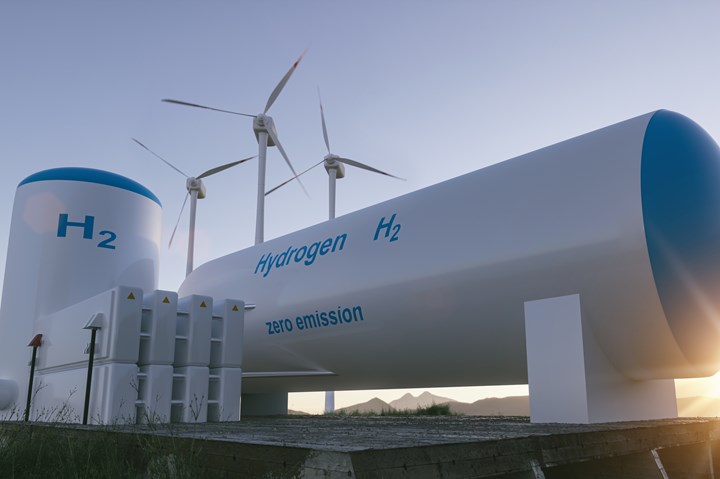Energy Earthshots Initiative launch aims to slash the cost of clean hydrogen
DOE Energy Earthshot: Hydrogen Shot hopes to accelerate a breakthrough of more abundant, affordable clean energy solutions by reducing hydrogen costs by 80% to $1/kg in one decade.

Photo Credit: Getty Images
Secretary of Energy Jennifer M. Granholm has launched the U.S. Department of Energy’s (DOE, Washington, D.C., U.S.) Energy Earthshots Initiative, to accelerate breakthroughs of more abundant, affordable and reliable clean energy solutions within the decade. The first Energy Earthshot — Hydrogen Shot — seeks to reduce the cost of clean hydrogen by 80% to $1 per kilogram in one decade. The DOE believed that achieving these targets will help the U.S. tackle the climate crisis, and more quickly reach the current administration’s goal of net-zero carbon emissions by 2050, while creating jobs and growing the economy.
“The Energy Earthshots are an all-hands-on-deck call for innovation, collaboration and acceleration of our clean energy economy by tackling the toughest remaining barriers to quickly deploy emerging clean energy technologies at scale,” says Secretary Granholm. “First up: Hydrogen Shot, which sets an ambitious yet achievable cost target to accelerate innovations and spur demand of clean hydrogen. Clean hydrogen is a game changer. It will help decarbonize high-polluting, heavy-duty and industrial sectors, while delivering clean energy jobs and realizing a net-zero economy by 2050.”
The Hydrogen Shot reportedly establishes a framework and foundation for clean hydrogen deployment in the American Jobs Plan, which includes support for demonstration projects. While industries are beginning to implement clean hydrogen to reduce emissions, there are still many hurdles to deploying it at scale. Currently, hydrogen from renewable energy costs about $5 per kilogram. By achieving Hydrogen Shot’s 80% cost reduction goal, the DOE says it can unlock a five-fold increase in demand by increasing clean hydrogen production from pathways such as renewables, nuclear and thermal conversion. This would create more clean energy jobs, reduce greenhouse gas emissions and position the U.S. to compete in the clean energy market on a global scale.
This announcement follows Secretary Granholm’s commitment, made during President Biden’s Leaders Summit on Climate, to propel next-generation technologies in key clean energy sectors. The Energy Earthshots is said will drive integrated program development across DOE’s science, applied energy offices and Advanced Research Projects Agency – Energy (ARPA-E) to address tough technological challenges and cost hurdles, and rapidly advance solutions to help achieve our climate and economic competitiveness goals.
As part of the launch, at the DOE’s Hydrogen Program Annual Merit Review and Peer Evaluation Meeting, DOE’s Hydrogen Program issued a Request for Information (RFI) on viable hydrogen demonstrations, including specific locations, that can help lower the cost of hydrogen, reduce carbon emissions and local air pollution, create good-paying jobs and provide benefits to disadvantaged communities. Topics in the RFI include:
- Hydrogen Production, resources, and infrastructure
- End users for hydrogen based on specific regions, cost and value propositions
- Greenhouse gas and other pollutant emissions reduction potential
- Diversity, equity, inclusion (DEI), jobs and environmental justice
- Science and innovation needs and challenges.
Responses are due July 7, 2021, by 5 p.m. ET. For more information about this RFI, visit EERE Exchange. For more information on DOE’s efforts to enable at-scale clean hydrogen, visit the Hydrogen Program and the H2@Scale pages.
Related Content
-
Composites end markets: Batteries and fuel cells (2024)
As the number of battery and fuel cell electric vehicles (EVs) grows, so do the opportunities for composites in battery enclosures and components for fuel cells.
-
ECOHYDRO project to enable recyclable composites for hydrogen storage
With the involvement of two schools from the Institut Mines-Télécom, the 4-year project aims to improve the intrinsic properties of a composite material based on Elium via four concrete demonstrators.
-
NCC reaches milestone in composite cryogenic hydrogen program
The National Composites Centre is testing composite cryogenic storage tank demonstrators with increasing complexity, to support U.K. transition to the hydrogen economy.
















